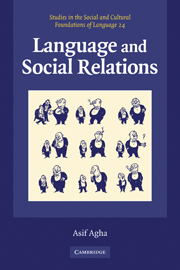Book contents
- Frontmatter
- Contents
- List of figures
- List of tables
- Acknowledgments
- Typographical conventions
- Introduction
- 1 Reflexivity
- 2 From referring to registers
- 3 Register formations
- 4 The social life of cultural value
- 5 Regrouping identity
- 6 Registers of person deixis
- 7 Honorific registers
- 8 Norm and trope in kinship behavior
- Notes
- References
- Index
- STUDIES IN THE SOCIAL AND CULTURAL FOUNDATIONS OF LANGUAGE
8 - Norm and trope in kinship behavior
Published online by Cambridge University Press: 05 September 2012
- Frontmatter
- Contents
- List of figures
- List of tables
- Acknowledgments
- Typographical conventions
- Introduction
- 1 Reflexivity
- 2 From referring to registers
- 3 Register formations
- 4 The social life of cultural value
- 5 Regrouping identity
- 6 Registers of person deixis
- 7 Honorific registers
- 8 Norm and trope in kinship behavior
- Notes
- References
- Index
- STUDIES IN THE SOCIAL AND CULTURAL FOUNDATIONS OF LANGUAGE
Summary
Introduction
In this chapter I outline a reflexive approach to the study of kinship relations. As in previous chapters, the approach sketched here differentiates a reflexive model of semiotic activity from the actual activities that the model organizes and enables for those acquainted with it. Many of the features of semiotic activity discussed in previous chapters – the interanimation of linguistic and non-linguistic signs, the enregisterment of models of action, their ‘normalization’ for certain practices and contexts of action, the tropic manipulation of norms in behavior – play a critical role in the picture of kinship developed here. A general implication of this approach is that many traditional assumptions regarding kinship – for instance, that every culture has uniformly shared concepts of kinship, or that the comparative study of kinship requires a universal concept of kinship – are shown to be fundamental mistakes that a theory of kinship must move beyond. Debates about ‘concepts’ of kinship are debates about reflexive models of kinship behavior. We have already seen in previous chapters that models of behavior become relevant to the actual conduct of those acquainted with them only under conditions where text-level indexicality imposes some further structure on acts of their performance and construal. This issue has important consequences for the comparative study of kinship.
- Type
- Chapter
- Information
- Language and Social Relations , pp. 340 - 385Publisher: Cambridge University PressPrint publication year: 2006



